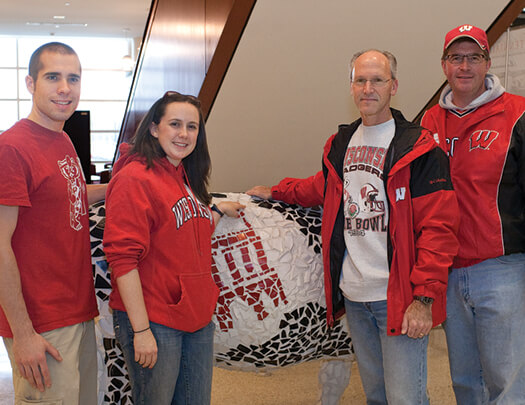More Great People

Gathering in the Health Sciences Learning Center before a Badger game last fall were, from left, Bob Zemple, second-year medical student and president, Medical Student Association; first-year medical student Carly Kuehn; Jeffrey Rosengarten ’80, MD’86; and John Kryger ’88, MD’92, president, Wisconsin Medical Alumni Association. Rosengarten and his wife have established the Rosengarten Family Great People Scholarship to benefit UW undergraduates and students in the School of Medicine and Public Health. Photo: John Wingren
Helping medical students with debt allows them to serve where the need is greatest.
Maybe it just comes with the territory — the impulse to care for others, that is.
For Jeffrey Rosengarten ’80, MD’86 and his family, providing for coming generations of students is just part of the caring equation. Rosengarten is the president and founder of Global Medical Imaging. He and his wife, Marcia, of Northbrook, Illinois, have established the Rosengarten Family Great People Scholarship. Their fund will benefit UW undergraduates and students in the School of Medicine and Public Health (SMPH).
“I firmly believe that over the course of your life, there are certain people and institutions who do good things for you, and it is then your moral obligation to return the favor in whatever way you can,” Rosengarten says. “Wisconsin decided to take a chance on me, and it laid the foundation for my life and career.”
Robert N. Golden, SMPH dean, praises the gift. “We are committed to educating future physicians who will serve where the need is greatest,” he says. “Unfortunately, many of our students take on very high levels of debt, which can make it difficult for them to pursue their original intentions. Dr. Rosengarten’s family gift, coupled with the Great People Scholarship program, will help our medical students pursue their dreams of public service.”
Rosengarten, who spent his boyhood in the Milwaukee area, attended UW-Milwaukee for six semesters while working full time. “I tell my children, ‘My biggest advantage while growing up was being financially disadvantaged,’ ” he says. “I quickly learned the value of hard work.”
In his young adulthood, two close friends died, including one who was murdered. “Those tragedies taught me how fragile and precious life could be,” Rosengarten says. He looked up his college adviser and expressed interest in being a physician — but was told that his grades weren’t good enough. Undeterred, he transferred to UW-Madison, applied himself, and was added to the wait list for the School of Medicine before finally being accepted. He took out loans and worked for a siding and roofing company and as a pharmacy technician his first two years of medical school.
After finishing his internship and residency requirements, Rosengarten joined Michael Reese Hospital and Medical Center, serving as an assistant professor of radiology, then as an associate professor, and as director of MRI and body imaging from 1991 to 2000. He left to form Global Medical Imaging and Gurnee Radiology Centers in Lake County, Illinois, a practice that now operates many centers in multiple states.
The Rosengarten family is deeply connected to the UW: their eldest son, Zach, is a senior; daughter Mikala is a freshman; and Joshua, a high school junior, hopes to be a Badger, too.
For third-year medical student Joe Lazar ’07, a scholarship is making a big difference. After starting his life in Slovakia, Lazar spent his early years in the Washington, D.C., area; moved with his family to Brookfield, Wisconsin, for his senior year of high school; and became a U.S. citizen. After earning his undergraduate degree at the UW, he says, “I loved it so much I decided to stick around another four years.”
Lazar is grateful for the scholarship that has eased some of his financial strain. “The cost of tuition keeps going up every year — and our tuition is reasonable, compared with many schools of the same high caliber across the country,” he says. An American Association of Medical Colleges study found that 80 percent of medical students graduating in 2008 had student loans totaling more than $100,000.
“It’s most important to be grateful and give thanks to these enormously generous people,” Lazar says of donors such as the Rosengartens. “I also think the donors would be proud of the people who are receiving these awards. As a student body and as individuals, we have provided some remarkable service to the community and made gifts of our own.”
Published in the Spring 2010 issue


Comments
No comments posted yet.